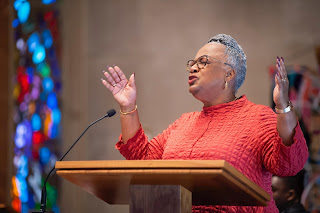Last night in my seminary class on Luke, we looked at the Mary and Martha story, the one where Martha says she needs help. It was a revelatory session, so I wanted to record it so I would be sure to remember it.
First we read the text out loud, or, my professor did. Here is Luke 9: 38-42 (NRSV, updated edition):
38 Now as they went on their way, he entered a certain village where a woman named Martha welcomed him.[k] 39 She had a sister named Mary, who sat at Jesus’s[l] feet and listened to what he was saying. 40 But Martha was distracted by her many tasks, so she came to him and asked, “Lord, do you not care that my sister has left me to do all the work by myself? Tell her, then, to help me.” 41 But the Lord answered her, “Martha, Martha, you are worried and distracted by many things, 42 but few things are needed—indeed only one.[m] Mary has chosen the better part, which will not be taken away from her.”And what did we notice? Martha doesn't specify what kind of help she wants and needs. For centuries, we've assumed it's some kind of help in the kitchen; for centuries, that's the only kind of work women would be doing. But that's not what the text says. We also see Mary as a passive figure, a very static part of the story. She might as well be the lamppost for all that she does.
Another word about Mary's choice. My professor disagrees with the word choice of better. She likes a translation that says "Mary has chosen what is good." It's not a competition.
It's interesting to consider this text in the context of what comes before and what comes after. In Luke 9 and 10, we've had lots of action: believers being sent out and coming back to report. We know that some of these believers were female.
We also have the story of the Good Samaritan just before Mary and Martha, and the Lord's Prayer just after, which the disciples receive when they ask Jesus to teach them to pray.
My professor presented this argument: perhaps we are seeing Martha's call story. In Martha, we see the dangers of the Good Samaritan model of discipleship: serving, and serving, and serving until there's nothing left to give. And what replenishes? Prayer.
My professor also suggested we read canonically. What happens if we consider this passage next to John's text, where we see Mary and Martha and their dead brother. Both characters are more fully formed and both engage Jesus. In fact, Martha gives one of the most powerful testimonies to the identity of Jesus in the Gospel of John.
My teacher reminded us that there is some doubt that these are the same women (they now have a brother, and the houses are in substantially different locations), but if they are, they have grown spiritually.
It's an exegesis that makes me so sad to think of the ways we've wasted this story and reduced it to a morality tale that tells women not to fuss over the housework but to shut up and sit at the feet of learned men in our orbit.












.jpeg)






















